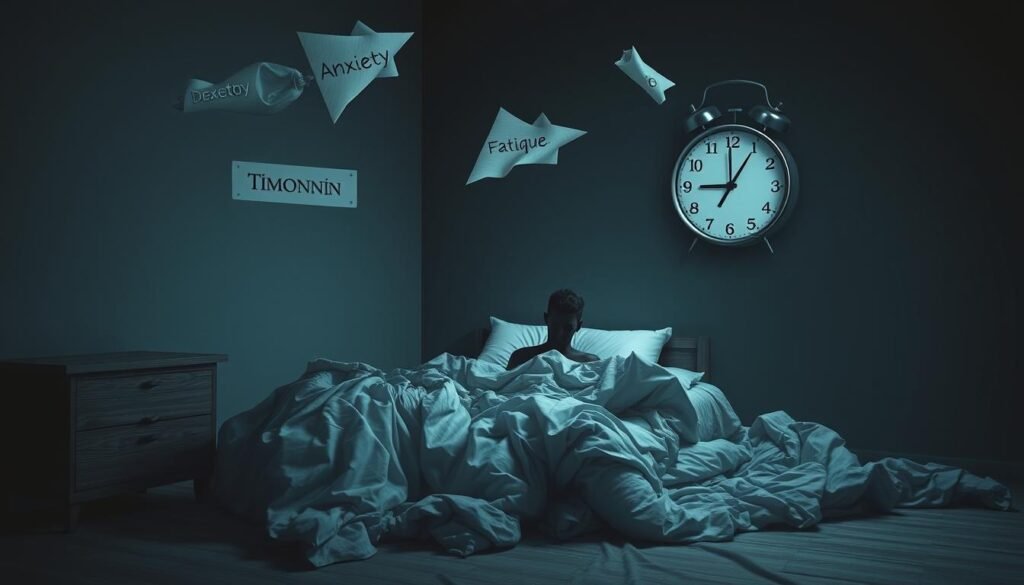About one-third of adults deal with insomnia, affecting how they feel and live. If you have other health problems like depression, obesity, or heart disease, it’s even more important to handle your sleep issues. This piece explores how tough it can be to manage sleep problems when you have other health issues too. It shows how closely linked sleep is to our overall health. Recognizing the importance of sleep, especially for people dealing with multiple health issues, is key.
Key Takeaways
- One-third of adults experience insomnia symptoms.
- Insomnia increases risks for depression, diabetes, and heart disease.
- Good sleep hygiene and consistent sleep schedules can improve sleep quality.
- Daytime naps may contribute to difficulty falling asleep at night.
- Healthcare providers play a key role in diagnosing and managing insomnia.
Understanding Insomnia: A Common Sleep Disorder
Insomnia affects about 30-35% of adults. It can really mess up someone’s day. People with insomnia may have trouble falling asleep, staying asleep, or waking up too early. They also might not sleep well.
This can lead to feeling very tired during the day, having trouble thinking, and feeling down. Over time, these problems can hurt someone’s health and how well they do things every day.
Definition and Symptoms of Insomnia
Insomnia means having a hard time sleeping for at least three nights a week for more than a month. People with insomnia feel very tired during the day. They also have a hard time focusing or remembering things.
This can make work and hanging out with friends difficult, lowering life quality. Getting help from mental health experts is a key way to deal with insomnia. It’s important to tackle insomnia from all angles.
Chronic vs. Acute Insomnia
It’s crucial to know the difference between chronic and acute insomnia for the right treatment. Chronic insomnia lasts for over three months and can be due to stress, bad sleep habits, or other health issues. On the other hand, acute insomnia comes from short-term stress and usually lasts a few days or weeks.
In the US, more than 25% of people use medicine to help them sleep. These can be prescription drugs or over-the-counter sleep aids. However, treating the root causes of insomnia is better for lasting health. For more tips on dealing with insomnia, check out effective approaches to treating insomnia.
The Impact of Insomnia on Overall Health
Insomnia greatly affects people’s lives. It intertwines with other health problems, leading to serious issues. Understanding how insomnia connects with these problems shows why managing sleep disorders is key.
Link Between Sleep Disorders and Comorbidities
Studies show that insomnia often comes with other health issues, making it hard for patients. About 30% of people show symptoms of insomnia, but this number changes based on how we define it. Women and older individuals are more likely to suffer from it.
A significant portion, between 10% and 18%, face severe, ongoing sleep problems. Insomnia lowers the quality of life a lot. Conditions like depression and anxiety are common with insomnia, making it harder to treat.
About 85 to 90 percent of chronic insomnia cases also deal with other health issues. The EuroQol-5 (EQ-5D) questionnaire helps in studying insomnia’s link to these problems.
Consequences of Sleep Deprivation
Not getting enough sleep does more than make you tired. It affects your thinking, lowers how well you perform, and increases accident risks. Sleeping less than 7 to 8 hours can make death 12% more likely. The risk grows with ongoing insomnia.
Solving insomnia and its effects is crucial for better health. Treatment must tackle the extra health issues tied to insomnia. It should also address how lack of sleep affects mental health.

Diagnosing Insomnia in Patients with Multiple Conditions
Diagnosing insomnia is tough, especially for people dealing with many health issues. Healthcare providers have a key role in figuring out this sleep problem. They look closely at patients’ sleep and how they function during the day. This helps them create a plan that’s just for that person. It all starts with a deep look at the patient’s sleep history, habits, and any other symptoms they have. Knowing all this is vital to help them properly.
The Role of Healthcare Providers
Doctors and sleep experts use different tools to diagnose insomnia. This might include sleep logs, questionnaires, and sometimes sleep studies. These tools help figure out what’s causing the sleep troubles. This is especially important for people who already have mental or physical health problems. The skills of these healthcare providers are important. They help make sure patients get diagnosed right and find good ways to deal with their sleep issues.
Assessing Sleep Patterns and Daytime Functioning
Looking at sleep patterns is a key part of figuring out insomnia. Knowing how a patient sleeps and what their nighttime and morning routines are like is very useful. Checking on how they do during the day is also important. It shows how their sleep problems are affecting their life. Healthcare providers think about how insomnia changes someone’s daily life, mood, and thinking. This gives a full picture of the patient’s situation.

Treating Insomnia in Patients with Multiple Conditions
Treating insomnia requires looking at the problem from several angles. This is especially true for those juggling various health issues. A blend of drug-based and non-drug approaches is often needed, tailored to what each patient needs. Integrative therapies add a lot to the effectiveness of treating insomnia. They tackle not just the symptoms but also the root causes of insomnia.
Integrative Approaches to Treatment
Using integrative therapies means considering the patient’s overall health. Changes in lifestyle like keeping a regular sleep schedule, cutting down on caffeine and alcohol, and creating a bedtime relaxation routine can make a big difference. For many, cognitive behavioral therapy for insomnia (CBT-I) is a top choice. It’s a structured program that changes how you think and act about sleep, often with great results.
Cognitive Behavioral Therapy for Insomnia
CBT-I stands out for its success in treating insomnia, even more so than sleep medications over time. It introduces techniques such as controlling the environment and limiting sleep times to change bedtime habits. Patients using CBT-I have seen better sleep quality and fewer signs of depression. Specifically, they’ve reported a 29% lower depression score compared to those on medication. For long-term insomnia sufferers, CBT-I has been a key to significantly better sleep and fewer mental health issues.
Medication Management Considerations
Managing medication is key for those with insomnia, especially when also treating other conditions. Though 2 to 6 percent of adults turn to sleep aids, it’s crucial to be careful because of their side effects, like feeling tired during the day. For falling asleep, options include Eszopiclone and Zolpidem tartrate. For staying asleep, Doxepin hydrochloride and Suvorexant might help. Yet, watching for drug interactions is critical. For a deeper dive into these medications, check out this article.

| Medication | Indication | Considerations |
|---|---|---|
| Eszopiclone | Difficulty falling asleep | Caution in patients with a history of substance abuse |
| Zolpidem tartrate | Difficulty falling asleep | Monitor for dependency |
| Doxepin hydrochloride | Difficulty staying asleep | Assess for potential interactions with other medications |
| Suvorexant | Difficulty staying asleep | May cause next-day drowsiness |
| Temazepam | Difficulty staying asleep | Potential for habit formation |
Lifestyle Modifications to Enhance Sleep Quality
Making small changes in your lifestyle can greatly improve sleep for those with insomnia. It’s about creating a better sleep environment. Focusing on a regular sleep schedule and good sleep hygiene is important.
Establishing a Consistent Sleep Schedule
Having a regular sleep pattern helps set your internal clock. This makes falling asleep and waking up easier. Adults should sleep at least seven hours each night. Sticking to the same bedtime and wake-up time daily boosts health. Sleeping at different times can worsen sleep quality and increase heart disease and depression risks. Avoid long naps during the day to prevent nighttime sleep troubles.
Importance of Sleep Hygiene Practices
Good sleep hygiene is key for quality rest. A comfy bed and a cool, dark room can make a big difference. Turn off screens like phones and TVs an hour before bed. It’s best to avoid big meals, caffeine, and alcohol before sleeping. Practices like meditation or deep breathing before bed can also help.
By following these tips, you can fight insomnia and sleep better. For more tips on improving sleep, check out this resource.
Stress Reduction Techniques for Better Sleep
Managing stress is key to better sleep. Incorporating relaxation techniques into your nightly routine can make a big difference. These methods, including mindfulness, can reduce anxiety linked to insomnia. This prepares you for better rest.
Relaxation Techniques Before Bedtime
Deep breathing and muscle relaxation help ease tension. Gentle activities like meditation and yoga trigger relaxation. A survey showed 44% of adults lose sleep over stress, highlighting the need for these techniques.
Taking 20 to 25 minutes for calming activities before bed improves stress levels. Here are some helpful techniques:
- Deep breathing exercises
- Progressive muscle relaxation
- Gentle yoga
- Meditation
- Calming music or sounds
Mindfulness and Stress Management Strategies
Mindfulness keeps you focused on now, easing worries and calm. Daily mindfulness makes body and mind relax more easily. It cuts stress and may result in fewer restless nights.
Some useful mindfulness and stress management techniques are:
- Mindfulness meditation
- Guided imagery
- Body scan meditation
- Gratitude journaling
- Positive affirmations
Regularly using these techniques boosts sleep quality. Those with insomnia find them beneficial. They help your mind and body handle sleeplessness better. By applying these methods, you’ll create a peaceful sleep environment. This leads to improved overall well-being.
Alternative Treatments and Therapies
Many people with sleep issues look at different treatments to find relief. Melatonin supplements and acupuncture are two popular options. They have shown promise in improving sleep quality when included in a total wellness plan.
The Role of Melatonin and Other Supplements
Melatonin is a common choice for sleep troubles. Research shows it might help people fall asleep more quickly. However, its effectiveness can vary greatly.
Other than melatonin, supplements like valerian root, chamomile, and ashwagandha are also helpful. Valerian root might lead to deeper sleep. Chamomile is a gentle option with few side effects. Ashwagandha could improve sleep by reducing stress.
Acupuncture and Herbal Remedies
Acupuncture has gained attention as a treatment for insomnia. It involves putting thin needles into the skin at certain points. This aims to balance the body and improve sleep. Herbal remedies like kava and special herbal blends can also ease stress-related sleep problems.
While these treatments can be beneficial, it’s vital to talk to a doctor before trying them. They’re not approved by the FDA and could have side effects.
| Treatment | Potential Benefit | Considerations |
|---|---|---|
| Melatonin Supplements | Helps fall asleep faster | Mixed study results, dosage matters |
| Valerian Root | Improves sleep onset and quality | Possible side effects: headache, dizziness |
| Chamomile | Gentle, safe sleep aid | Generally well-tolerated |
| Ashwagandha | May enhance sleep quality | Consult before use |
| Acupuncture | Improves overall sleep quality | Requires a trained professional |
| Kava | Beneficial for stress-induced insomnia | Potential for dependency |
Choosing alternative treatments should be done with caution. Talking to a doctor is crucial. This ensures the treatments chosen are safe and right for the individual’s specific needs.
Living with Insomnia: Strategies for Patients
Insomnia is tough to live with, but there are ways to feel better. It’s key to talk openly with your doctors about how you’re doing, your meds, and life habits. Knowing about your condition and choices helps you feel supported. Being part of the conversation helps you on your path to better sleep.
Maintaining Communication with Healthcare Providers
Talking well with your doctors is crucial if you’re dealing with insomnia. Having regular chats helps clear up your treatment plan. It lets you share what’s going on and how you react to treatments. Knowing what works and what doesn’t lets your care be more specific. This teamwork builds trust and makes you active in your health care.
Tracking Sleep Patterns and Progress
Keeping a close eye on your sleep helps a lot. Writing down your sleep habits gives clear clues over time. It shows what changes your sleep for better or worse. You should note when you sleep, wake up, and anything that affects your rest. This diary is vital for talking with doctors to tweak your care plan.
| Tracking Sleep Patterns | Key Elements |
|---|---|
| Date | Record the specific date for reference. |
| Sleep Times | Note time going to bed and waking up. |
| Number of Awakenings | Count how many times you wake during the night. |
| Duration of Sleep | Estimate total sleep time. |
| Daytime Effects | Reflect on mood, energy, and overall well-being during the day. |
Doing these things can make living with insomnia easier. It gives you the tools and info to work toward better sleep. For more on treatment, like cognitive therapy, please check the resources here.
Conclusion
Managing insomnia, especially with other health issues, needs a deep understanding of how they’re all connected. Studies have found that up to 33% of people might suffer from insomnia. This number jumps to 69% among folks seeing their primary care doctors. Knowing how insomnia links with anxiety, depression, and chronic pain is key for better health and life quality.
For patients with several health problems, a custom treatment plan is crucial. Cognitive Behavioral Therapy for Insomnia (CBTI) is a great tool. It helps reduce insomnia symptoms and also improves related psychiatric conditions. CBTI is often better than medication, which can have unwanted effects and lead to dependency.
Constant support and talking with healthcare providers are vital. They make sure patients get the best care for their sleep issues and other health challenges. Adopting a whole-patient approach can greatly improve someone’s health now and in the long run. To learn more about how Cognitive Behavioral Therapy for Insomnia helps, check out this informative source.